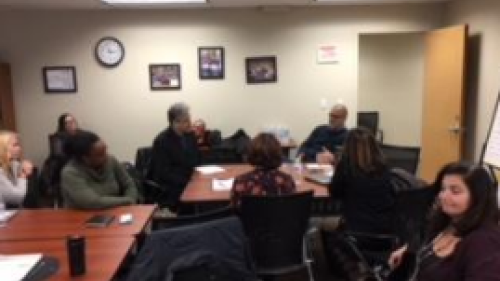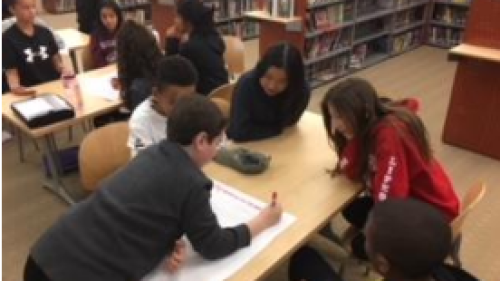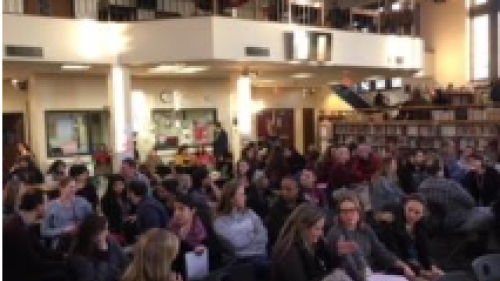
Much of the work of NYU Metro Center includes providing technical assistance and professional development to schools and districts around the country. This work is grounded in advancing equity and racial justice. Thus, over decades of practice-to-research and engaged evaluation work, NYU Metro Center has found a number of approaches most effective at shifting policies, practices, and, ultimately (and perhaps most importantly), beliefs. One approach to school change, a systems-approach model, is being reimagined by The Center for Strategic Solutions (CSS) at NYU Metro Center in Ossining Union Free School District, located just north of New York City in Westchester County, NY.
The system-wide equity intervention (EQI), designed by CSS, sees leadership as the most leverageable force required for transforming schools. In year one, leadership participates in a retreat to lay the groundwork for developing a shared language and approach for educational equity. Then a district-wide committee of diverse stakeholders, including district and building leadership, teachers, staff, parents, students, and Board of Education and community members, meet monthly to build capacity and develop a set of recommendations for the district to promote a positive climate that disrupts the influence of bias and dismantles barriers to equity. These recommendations are then presented to, and adopted by, the Board of Education. Dramatic shifts in mindset and approaches to cross-racial, cross- ethnic, and cross-identity interactions and relationships are evidenced.

In year two, the work impacts more stakeholders through the establishment of building-level equity committees, district-wide professional development, student equity leaders at the secondary level, and Board of Education training. District leaders continue learning through case study analysis and role-playing scenarios where they must flex their racial literacy muscles and actualize their learning. Each of these committees and structures becomes a part of the fabric of the district.

By the end of year three, all staff in district have been impacted through trainings for office staff, bus drivers, security guards, parents, and community members. A shared language and approach are reflected across all levels of the district and measurable impacts across student outcome variables are expected. The EQI puts in place forums to continue to build capacity and address challenges in applying an equity lens to teaching, planning, policy development, and data analysis. What results is a system wherein individuals see the role they play individually and collectively within their spheres of influence to dismantle inequities.

I sat down with Ossining Superintendent, Ray Sanchez, to get a sense of what advancing equity within and across a system can look like and accomplish.
Natalie Zwerger: As the superintendent, what do you feel is most important about your role in promoting equity in Ossining?
RS: Setting the vision, making sure systems are in place to ensure excellence for all kids & monitoring them to make sure we meet the needs of our kids. Making sure we make changes based on the data we see and gather.
NZ: What have you experienced as the biggest challenges to promoting equity in Ossining?
RS: Developing common understandings, mindset shifts, changes in beliefs, and making sure systems talk together across the district.
NZ: In what ways, if any, has your understanding of educational equity changed while doing this work?
RS: The truth is I’m always growing. I’m a learner. What I’ve learned more and more is that putting myself out there as a learner is important.
NZ: How have you worked to get other stakeholders in the district to buy-in to this work?
RS: Bringing different stakeholders to the table. It’s us learning together. It is then about applying the learning to Ossining. Overall, different perspectives are very important.
NZ: What advice do you have for other superintendents who want to embark on equity initiatives in their districts?
RS: Take it slow. It’s important to do this in a thoughtful way. Think systemically and look for staying power. Give it the time it needs. Apply a lens to how the work has sticking power beyond your superintendency.

At the upcoming session with the Instructional Leadership Council, that includes all district and building leaders, Ossining leadership will focus on a question designed by Dr. Ann Dealy, Brookside Elementary School Principal: What about your leadership, individually and collectively, operationalizes equity every day? This question is indicative of an approach that is grounded in application of theory and learning to daily practice.
*CSS is currently implementing using its equity model of systems transformation work to answer similar questions in Arlington Central School District (NY) and Matawan-Aberdeen Regional School District (NJ). Stay tuned for future posts on how those districts progress in their work.
Natalie Zwerger is the director of the Center for Strategic Solutions at NYU Metro Center. She is a frequent contributor to the NYU Metro Center Blog and can be reached by email at: nz11@nyu.edu.

